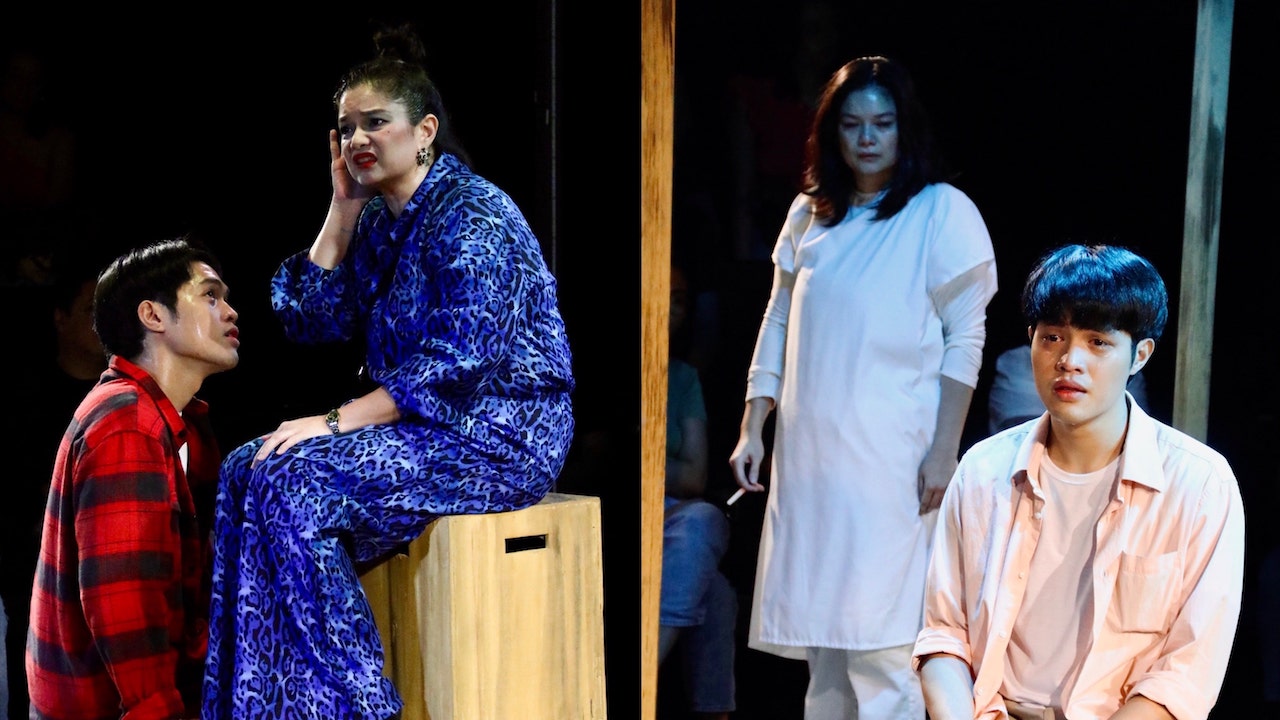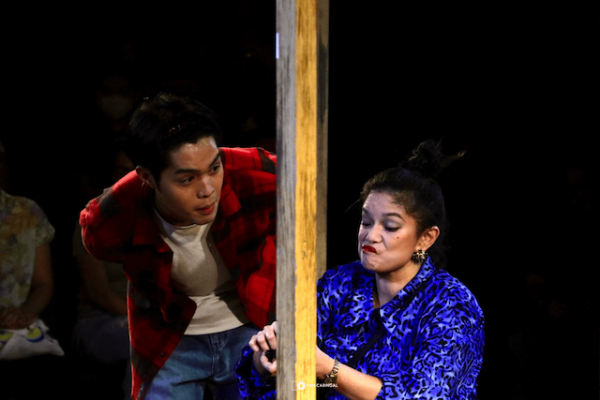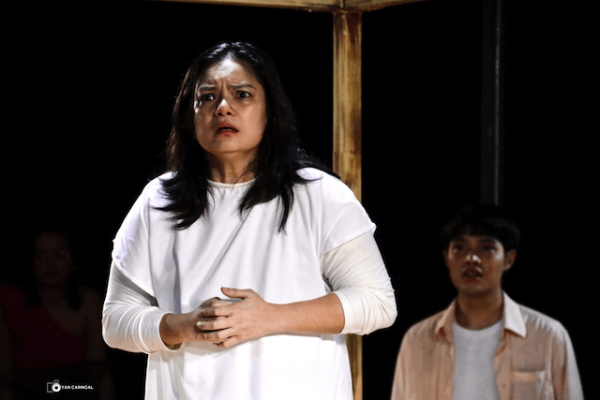
REVIEW: Elijah Canlas and Meryll Soriano talk martial law in twin bill ‘Emulsyon’
Elijah Canlas and Meryll Soriano paint characters of remarkable depth in this modest but clear-eyed production on how we talk about martial law.
A twin bill is as much an exercise in curation as it is a showcase of two separate works. Through juxtaposition, various qualities of each play that may have otherwise gone unnoticed are brought to the forefront. And so Apothecary Productions’ Emulsyon—which pairs Kanakan-Balintagos’ Loyalist Redux with Rody Vera’s Indigo Child, both originally staged in 2016—isn’t just a diptych of post-martial law stories between mothers and sons, but a study in how different generations navigate their trauma and broken family lives through conversation.
Further strengthening the ties between these stories, both plays make use of the same set and the same cast. The resulting production, even with its modest scale, displays clear vision on the part of director Heart Romero in conveying a greater sense of space and movement on a small stage—on which Elijah Canlas and especially Meryll Soriano paint characters of remarkable depth within two 40-minute chapters.
Loyalist Redux

Elijah Canlas as Anak and Meryll Soriano as Ma in Loyalist Redux; Photo Credit: Yan Caringal
The first one-act play opens on a broadly comic, almost absurdist, register, as the news of Imelda Marcos’ return to the Philippines in 1992 wakes a loyalist mother and her student activist-artist son. Almost immediately, Canlas and Soriano begin to pace the stage (with production design by Styze Genodia): a square walkway bordering a large cubic frame, which the silent ensemble members (played by Jay Entienza, Dia Papio, and Ivan Hinggan) can rotate as if on a turntable. As much as the characters insist that they are going to head to work or to class, their opposing political beliefs and the frustrated care they still have for one another keep them boxed into heated debate.
Perpetual motion is key to how Romero maintains tension throughout Loyalist Redux. The actors are constantly moving, rearranging, and climbing on top of boxes that fill up the set, punctuating the dialogue with loud, synchronized movements. Canlas plays up his character’s idealism to a level of proud self-righteousness, which he uses to provoke—then eventually to open up to—his mother. And in this role, Soriano struts about like an illustration from a Roald Dahl book: puffy clothing (also care of costume designer Genodia), ostentatious movements, eyes popping out of her head. And yet she leaves plenty of room for sympathy, her outbursts always stemming from a more pained source.
Kanakan-Balintagos’ script is amusing and informative in how it articulates these household arguments, but it only truly becomes revelatory when it gestures toward the shared reasons why the two feel the need to assert themselves so strongly. But perhaps due to the material’s age (and the inevitable way our political landscape continues to change), the uncertain conclusions that Loyalist Redux arrives at feel anticlimactic and incomplete now, especially given how much they’re set up. There’s a sense that the play is throwing up its hands and surrendering to the mess of it all, which feels too much like an easy way out.
Indigo Child

Meryll Soriano as Felisa-and Elijah Canlas as Jerome in Indigo Child; Photo Credit: Yan Caringal
Fortunately, the first play retroactively takes on more significance thanks to the second. Vera’s Indigo Child drastically flips Soriano’s role to that of martial law torture survivor Felisa (inspired by the activist Adora Faye de Vera) receiving electric shock therapy, which reawakens her suppressed memories. As her son Jerome, Canlas begins from a place of seeming control over his visit to her treatment center, but eventually allows waves of emotion to reduce him to tears. However, it is once again Soriano who commands the room—so animated by her character’s haunted past that it becomes both frightening and invigorating to watch her.
Romero’s approach to the set is now also strikingly different: this time, she establishes clear boundaries between the outer walkway and the interior of the cube frame. The only way Canlas and Soriano can really communicate, touch, or share a cigarette is through the same ensemble, who act as circuits connecting mother to son, rippling towards one or the other—and eventually silently weeping themselves, even as they stoically face the audience. Harsh bolts of electricity (lights by Rafa Sumilong and sound by Alyssa Clare and Darylle Faith) shock the rest of the stage to life as the drama goes on, leading up to the play’s use of darkness and spotlights in a powerful, eerie conclusion.
Vera’s script proceeds like a mystery unraveling, and the play is at its best when pointing toward not just the realities of martial law torture, but the reasons why a mother might hide the horrors of truth from her child. But as Felisa passes her hope in the future to her mortified son, this hope becomes a burden, then a responsibility. Just like in Loyalist Redux, this is a family unit abandoned by its supposedly strong father, leaving wife and child with vastly different perspectives on the same conflicts. All they can really do is talk, finding in words either a path towards reconciliation or the tools needed to reawaken the fight for justice.
Tickets: P1500 – P2000
Show Dates: Nov 8–23 2024
Venue: Black Box Theater, Erehwon Center for the Arts, Quezon City
Running Time: approximately 1 hour and 40 minutes (including a 10-minute intermission)
Creatives: Kanakan-Balintagos (Playwright – Loyalist Redux), Rody Vera (Playwright – Indigo Child), Heart Romero (Director, Producer), Philip Matthew Gloria (Assistant Direction), Ariane Erika Estacio (Dramaturgy), Io Balanon (Technical Direction), Rafa Sumilong (Lighting Design), EJ Ramos (Assistant Lighting Design), Styze Genodia (Production Design, Costume Design), Alyssa Clare (Sound Design), Darylle Faith (Sound Design)
Cast: Meryll Soriano, Noelle Polack, Elijah Canlas, Nathan Molina, Jay Entienza, Dia Papio, Ivan Hinggan
Company: Apothecary Productions


Comments